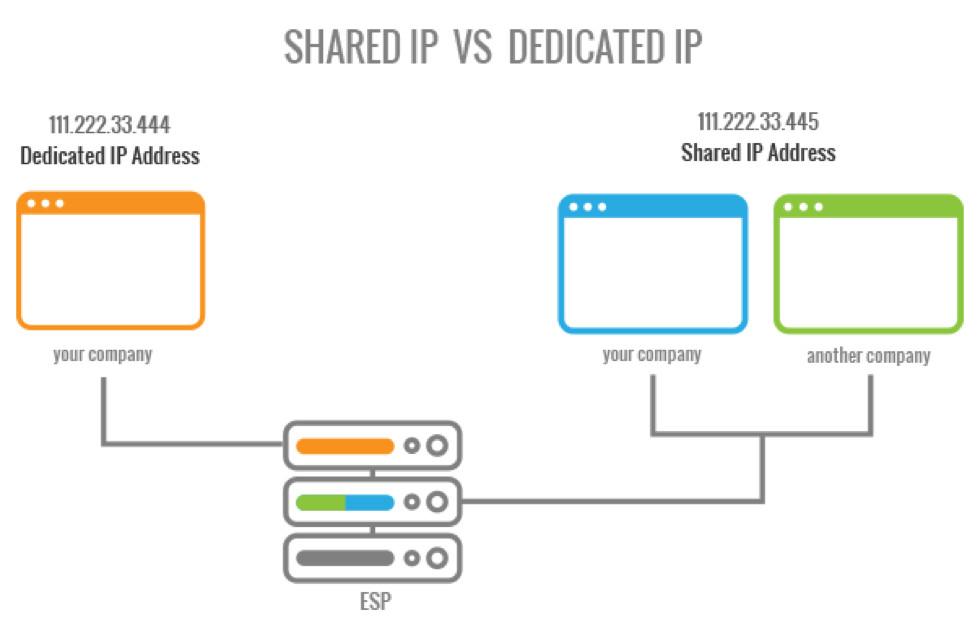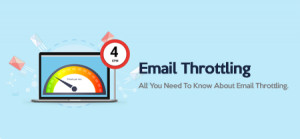If you've been in the email marketing field, you've probably heard some discussion about the subject of email delivery (the ability of your emails to end up in the inbox of your contact rather than in the spam folder). And it's hard to have an email deliverability conversation without thinking about IP addresses of the sender.
What is a Dedicated Email IP?
Unlike shared email IP; dedicated email IP solely belongs to one sender or a user. The user of a dedicated email IP is in complete control of maintaining his email sending reputation. As the name says, dedicated email IP is not shared with anyone there is no risk of worrying about the quality of an email sending IP.

Shared IP vs Dedicated IP.
Here is a detailed table which describes the differences between shared and dedicated IP addresses.
| Particulars | Shared IP | Dedicated IP |
|---|---|---|
| Meaning | It is shared by a group of companies sending out email campaigns. | It is owned by one company who uses it to send out their email campaigns. |
| Cost | Cost of shared IP is spread across several companies. Hence it costs less. | It is costly as it will be used by only one company. |
| Volume of Emails | All major ISPs look for consistent and decent email sending volume in order to allow emails to reach into the inboxes. As a shared IP is used by a group several companies there will be a good volume of emails on a consistent basis. This high volume of email sending does not require warming up of an email IP. | Dedicated email IP requires a warm up in order to be marked as a reputed sender by ISPs. Your email campaign needs to be consistent with larger sending volume, this will ensure that your company is marked as a spam-free sender. |
| Quality of List | As a part of good sending practices, it requires to keep bounce rates in check. If you are not cleaning your email list - shared IP would be a better option. Also, major email service providers have a policy on the cleanliness of the email list as well as have certain import rules. | For using a dedicated email IP it is must to keep your email list clean at all times. All the failed deliveries, as well as unsubscribers, must be dropped from your email database to abide by email sending rules. |
| Sending Practices | The reputation of Shared IP is determined by the email sending practices of the group of companies using that particular IP. The IP's are monitored by ESPs in orders to detect poor sending practices in a timely manner. However, it is a risky option if you are planning to send a high volume of emails on a consistent basis. | There is a list of things that need to be followed while using dedicate email IP like email list hygiene; CAN-SPAM regulations and so on. Failing in following the set of rules can cost you the IP itself, which can be a costly affair. |
Do I need Dedicated Email IP?
It is not ensured that using a dedicated email IP, your emails will be delivered into the inboxes. Sorry! It’s complicated.
To decide on dedicated email IP you first need to take a closer look at your spending on email marketing plus ROIs. If you can afford all the cost associated and follow all the required set of rules dedicated IP is for you.
Shared IP can be a better bet if you want to send emails once in a while with low volumes.
Benefits of Dedicated Email IP?
- Your email delivery and sender's reputation is safe
- Emails are delivered smoothly to all majors ISPs like Yahoo, Gmail, and Hotmail
- Better inbox placements
- Increased revenues with higher engagements
Importance of Warming up a Dedicated Email IP
As an email marketer or a business sending out email campaigns to a larger group of people, you will want to land your emails into the inboxes of the recipients and not in the spam folder. Dedicated email IP is one of the many things that decrease your chances of landing into the spam box.
With a newly set-up IP, it is important to build a good reputation with ISPs. In order to be marked as a safe sender, your dedicated email IP needs to be warmed up. It is a process of sending out smaller volumes of email and then increasing the volume gradually.
The process of warming up an IP continues for a course of a few days or sometimes weeks until the IP is able to handle the full volume of emails.
How to Warm up Dedicated Email IP
Work on an IP warm-up schedule and gradually increase your email campaigns' number of recipients. Depending on a list of factors, the schedule may vary: mailing list hygiene, reputation for the website and email domain, spam complaints, email content, subscriber engagements, etc.
Send messages to the most engaged users, gradually adding less involved audience. For example, you can include recipients who have been active for the previous 30 days during the first and second week of your campaign, then add recipients who have been active for the previous 30-60 days, and exclude those who haven’t opened your messages for 90 days during the third and fourth weeks respectively.
Send messages to the most committed users, adding less involved audiences gradually. For example, you can include recipients who have been active for the last month during the first and second week of your campaign, then add recipients who have been active for the previous 30 - 60 days, and exclude those who have not opened your messages for last 3 months.
Try to target the most engaged users first.
Here is a reasonable schedule to warm-up your dedicated IP:

Two weeks IP warm-up schedule.
The more consistent you are with volume, frequency, complaint and bounce levels during the warm - up phase, the faster you create a positive reputation for sending. If you send rarely, it will take more time to build a positive reputation for sending anything less than a week. Remember to check the activity of the recipients throughout the warm - up period — if it is low, slow down and do not increase the daily volumes before you begin to notice positive changes in the engagement of the subscribers.



![Best Mailchimp Alternatives for (Free & Paid) [2025]](https://ik.imagekit.io/debounce/wp-content/uploads/2022/11/mailchimp-alternatives-300x139.png)

